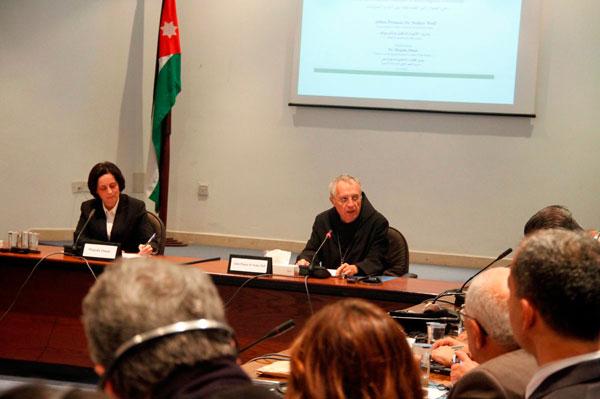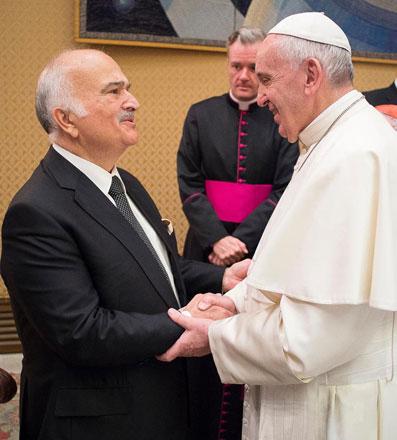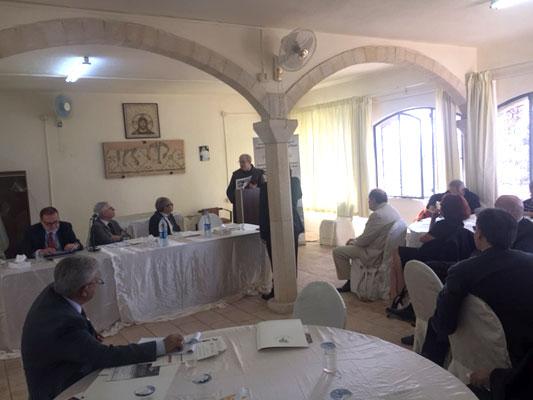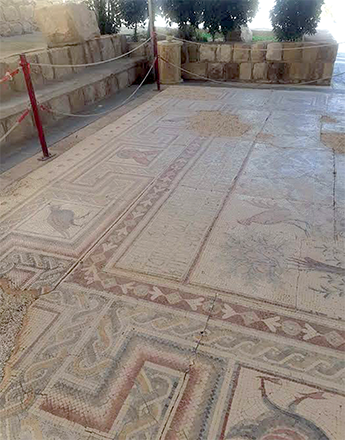You are here
Benedictine abbot calls for 'vision of unity in differences'
By Rula Samain - Mar 17,2016 - Last updated at Mar 17,2016

Notker Wolf, the abbot primate of the Benedictine Confederation of the Order of Saint Benedict, delivers a lecture in Amman earlier this week (Petra photo)
AMMAN — Interreligious dialogue should surpass the intellectual discussion of similarities and differences, and focus instead on the dialogue of the heart to overcome difficulties, said Notker Wolf, the abbot primate of the Benedictine Confederation of the Order of Saint Benedict.
Delivering a lecture earlier this week, the author of 19 bestsellers talked about monastic interreligious experiences based on building strong friendships between the followers of different faiths.
This method, he said, is the right way to achieve dialogue.
Wolf noted that in order to establish a friendship one must live the life of the other.
“In the summer of 1979, a large group of Japanese monks and nuns came to Europe for the first spiritual exchange between the East and West, where they stayed for almost two weeks in different Benedictine monasteries... Later some of [the] monastic priests lived in Zen monasteries, where we lived their life in full, worked, and read our sacred books together,” the abbot said.
Wolf added that such encounters create mutual respect and friendship. “It does not mean we become Buddhists or they become Christians,” he explained, observing that humanity needs to build on ethics to survive; otherwise, chaos will prevail.
According to the representative of the worldwide Benedictine Order, followers of different religions should make the effort to come together, and “the rest is God’s work”.
The lecture was organised by the Royal Institute for Inter-Faith Studies, in cooperation with the Arab Thought Forum.
“The world is growing and the time has come to surmount all kinds of cultural and religious clashes, and collaborate for a future peace, justice and respect, which means we need to learn to live together in harmony,” Wolf noted.
He said that equality and justice are key to harmonious living, and balance between faith and reason is equally important. “Without reason, we fall in the trap of fundamentalism; combining faith and reason — which is not easy — results in obtaining human dignity and freedom,” Wolf said.
“In our globalising world, we need a vision of unity in differences. The worlds of tomorrow will need a loving heart. Interreligious friendship will make it happen.”
Related Articles
AMMAN — Human dignity must be the highest priority above all else, HRH Prince Hassan, the chairman of the Royal Institute for Inter-Faith St
MADABA — Interreligious dialogue must be followed by action and inspire working together to shape a culture of peace and harmony
AMMAN — During the 3rd century AD, monks established the first monastic centres in the Levant, drawn to this region for its suitability for



















